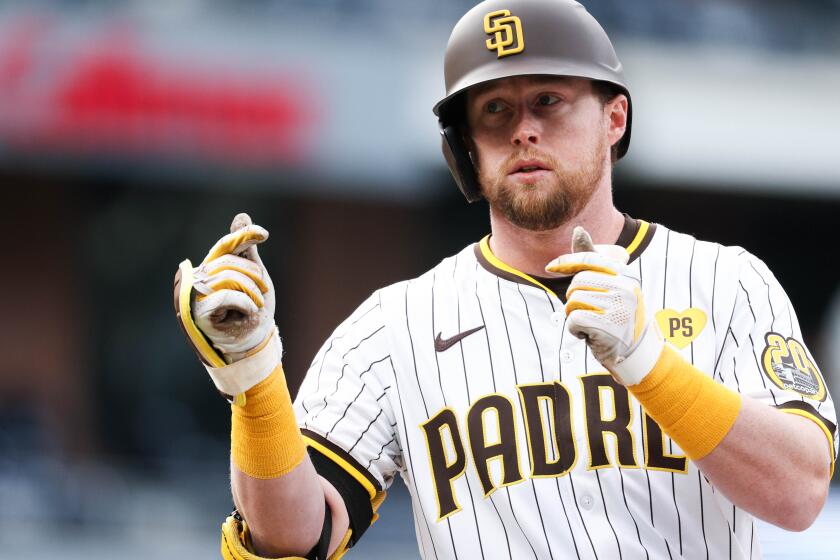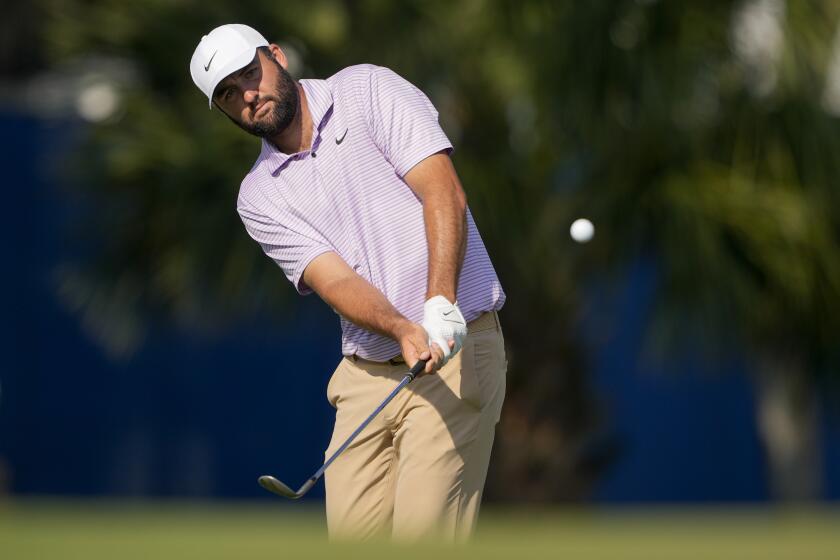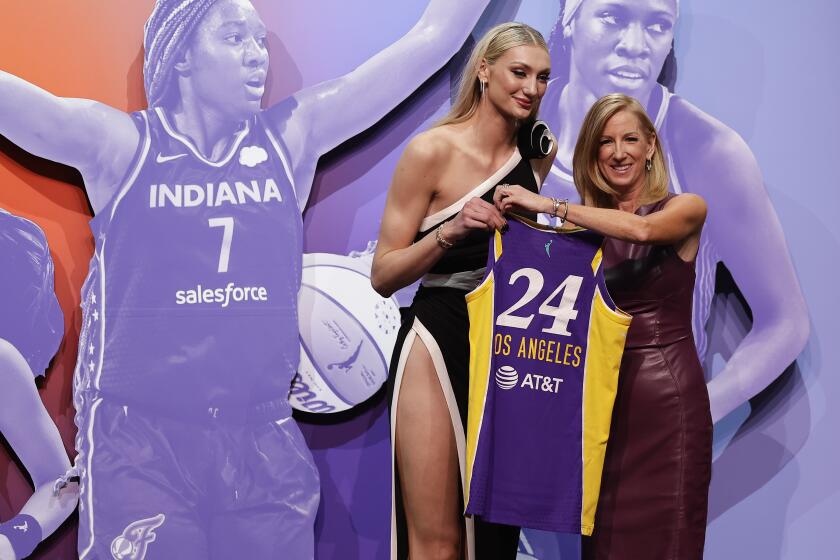Lacrosse team forms bond with young cancer patient
Torrey Pines High School’s boys lacrosse team, nattily attired in khaki slacks and team polo shirts, meets inside the school media center on a chilly evening in December. The matter of business: welcoming a new member to the team.
Wanting to check out the kid’s skill level, rubber balls are spread on the carpet, a goal set up and the boy, wielding a hockey stick, fires slap shots at the net.
“He’s got like a 100 mph slap shot,” junior Caden Wolfson says in admiration.
Players test the youngster’s hand-eye coordination, tossing him Wiffle balls. Swinging a plastic bat, the boy belts line drives off bookshelves.
“The guy’s going yard,” says senior Chase Fanning.
At 3-foot-8-inches tall and weighing 40 pounds, the lad is a little on the small side. The newest Falcon is Irving Goodman, a 6-year-old battling a rare form of cancer. The Falcons are adopting Irving, his three brothers and the entire Goodman family as part of the Friends of Jaclyn Foundation.

The “I” in Team
Friends of Jaclyn is a New York-based organization that pairs children battling cancer with high school and college sports teams.
“There’s no chemotherapy, there’s no radiation treatment or clinical trial drug better than love, support and friendship,” Friends of Jaclyn President Denis Murphy tells the players after flying cross-country to attend the adoption.
Mimicking a star high school athlete signing a scholarship with a college team, that night the Falcons sign Irving and two of his brothers — Robert, 8, and Asher, 4 — to “letters of intent” to play lacrosse at Torrey Pines. The boys are given Torrey Pines jerseys. Irving wolfs down pizza and cake.
“You guys have a million other things you could be doing,” Joe Goodman, Irving’s father, tells the team. “For you to be here, showing us attention and playing with (my boys), I can’t tell you how meaningful it is to us. We’re overwhelmed with your love and support.”
Irving Goodman is the second child fighting cancer that the Torrey Pines lacrosse team has adopted through the Friends of Jaclyn Foundation. The first was Jose Montaño.
In a modest Nestor home just minutes north of the border, atop the mantel rests a framed No. 11 Torrey Pines lacrosse jersey, autographed by Falcons players. Four lacrosse sticks frame the fireplace. Resting on a tripod in front of the fireplace is a framed picture of 12-year-old Jose Montaño, standing on the sideline with Torrey Pines players for the national anthem before a 2013 game.
Jose was diagnosed with brain cancer in 2011. That same year, Torrey Pines lacrosse coach Jono Zissi was told by a childhood friend about the Friends of Jaclyn Foundation.
“You’ve got to do this,” said the friend, the men’s soccer coach at Amherst College in Massachusetts.
Zissi contacted Murphy. Arrangements were made, and the Falcons were paired with the Montaño family. Torrey Pines became the first high school team in the Friends of Jaclyn Foundation to adopt a child.
Created in 2005, the Friends of Jaclyn Foundation has paired nearly 700 children fighting cancer with college and high school teams. It was founded by Murphy, whose daughter, Jaclyn, was diagnosed with brain cancer and later was befriended by the Northwestern women’s lacrosse team.
Jose Montaño met the Falcons for the first time before a game early in the 2012 season and there was an almost immediate bond. Despite battling cancer, Jose, then 11, exuded happiness. He was selfless, too. Approached by the Make-A-Wish Foundation, Jose didn’t ask for a trip or to meet a celebrity. Instead, he requested that his elementary school be given a new playground.
“He never let his personal struggles affect his radiating smile,” says Beau Botkiss, a Harvard-bound senior and captain of this year’s Torrey Pines team. “He was contagious with laughter and happiness.”
Across the next three seasons, the Montaño family piled into the family pickup truck, battled Interstate 5 traffic and drove 33 miles to Torrey Pines home games. The Falcons gave lacrosse sticks and jerseys to Jose, plus his younger brothers, Ismael, Miguel, Alex and Joel.
“(The players) would play with my kids on the sideline,” says Jose Sr. “It wasn’t for the cameras. It wasn’t for a résumé. We found them sincere, down-to-earth people.”
The team attended birthday parties for Jose, played kickball with the Montaños at Mission Bay Park, took the family to play laser tag. During the course of his cancer fight, Jose was often hospitalized. Torrey Pines players visited him regularly at Rady Children’s Hospital.
“We always saw Jose as another teammate, a brother on our team,” says Botkiss.
Sitting at home, next to the fireplace that bears a tribute to her son’s friendship with the Falcons, Veronica Montaño says, “When they arrived at the hospital, my son’s face would suddenly change. He would be so happy they were with him.”
By the 2014 season, Jose’s health was deteriorating. On April 13, 2014, Jose Montaño died. He was 13 years old. More than 40 Torrey Pines players and coaches attended Jose’s wake. A small number of people eulogized Jose, including Rich Rosales, a former Falcon who graduated the year before.
“We all looked up to him and he was a leader to us,” says Rosales, now a student at Santa Monica Community College. “He taught us about how to treat other people, how to spend our lives when we’re on this Earth.”
Torrey Pines’ black helmets include a sticker with the initials JM and the number 11. When the Falcons adopted Jose, they gave him that No. 11 jersey that sits atop the Montaño fireplace. Zissi says that as long as he’s the Falcons’ coach, no one will wear the number.
“Jose’s forever etched in our program,” he says.
On April 8, 2015, Kristina Goodman took Irving to the doctor for his annual checkup. Her son celebrated his sixth birthday the day before. The checkup turns out to be anything but routine. A lump is found near his waist.
Two days later, the mass is removed. On April 14, a pediatric oncologist tells the Goodmans that Irving has been diagnosed with rhabdomyosarcoma, a rare cancer seen mainly in children that usually develops in a muscle.
“One of the worst days of our life,” says Joe Goodman.
Adds Kristina at the family’s Carmel Valley home, sitting in a living room strewn with books and toys, her voice choking, “You just start bawling.”
On May 1, Irving began chemotherapy, 40 treatments spread across 48 weeks.
Meanwhile, Torrey Pines’ lacrosse program had spent the past year mourning Jose’s death.
“For many of them,” says Zissi, “it was the first time they’d dealt with death.”
But as players graduated in 2014 and 2015, the roster turned over and Zissi felt it was time for the Falcons to adopt another child battling cancer. An acquaintance of the Goodmans’ whose son had been adopted through the Friends of Jaclyn Foundation told the family about the program and that Torrey Pines was looking to adopt a child.
There was one problem.
When Joe and Kristina told their son about the opportunity, Irving, who was shy even before he was diagnosed with cancer, says he didn’t want to be adopted by the team.
“After a few months of treatment, in a lot of situations, he would kind of go into a shell,” Joe says. “He would not be responsive, especially to adults.”
Joe emailed the foundation, saying Irving wouldn’t be a fit for the program.
A couple weeks later, Joe opened an email from the foundation, which asked if Irving might reconsider. In the interim, the family watched a video about Jose Montaño’s story, plus videos on the foundation’s website about other children who benefited from the program.
“I asked Irving again,” Joe says. “I was surprised he changed his mind. I didn’t expect it. I thought he’d say no.”
Torrey Pines’ lacrosse program became the first high school team to be granted a second adoption by the Friends of Jaclyn Foundation.
Having been warned by Joe Goodman that Irving was shy, Zissi wanted to make the initial meeting last November small and casual.
“If he had walked into a locker room with 45 players, he probably would have been terrified,” Zissi says.
Irving, his brother, Robert, and their father met Zissi and a few seniors for the first time in November. The boys, who had never played lacrosse, were given sticks. After introductions, the group headed to the football field. The players showed the boys lacrosse basics — how to cradle the ball in the webbing, pass and catch the ball, fire shots.
Robert eagerly joined in the fun. Zissi remembers Irving virtually cowering behind his father’s leg. Joe, an attorney, is also quiet and reserved. After dealing with the outgoing Jose Montaño Sr. and effervescent Jose, Zissi wondered if the adoption would work with the Goodmans.
“You have to open your family to our team,” Zissi said months ago.
With three championships in the past five seasons, Torrey Pines boasts the most successful boys’ lacrosse program in the San Diego Section. But in 2016, the Falcons faced two significant challenges: winning another title and winning over Irving.
As adopted members of the Torrey Pines lacrosse team — an adoption that lasts for the rest of the cancer patient’s life — the Goodmans are granted front-row seats, standing along the home sideline at Ed Burke Field. Before the 2016 home opener on March 10 against Grossmont, players approach Irving, who’s lugging his lacrosse stick and decked out in his No. 14 jersey.
Squatting so he’s at Irving’s level, midfielder Ara Suhadolnik says, “What’s up, Irving? How you doing? You having fun?”
Irving says nothing, keeping his head down, his face virtually hidden by a baseball cap.
“All right. See you later,” says Suhadolnik.
“He’s really shut down,” says Joe. “… I don’t like to use the word irritable. But I can’t describe what it feels like (to be 6 years old and going through chemotherapy). I’m sure he doesn’t feel right.”
Playing by himself most of the game, Irving passes time with stick in hands, firing balls into a miniature net. The Falcons rout Grossmont 20-1.
“Thank you guys for coming,” goalie Max McGuire tells Irving and Robert after the game.
“Later, boys,” says midfielder Spence Small, bending down to get a fist bump from the brothers. “Gimme some.”
The brothers bump their small knuckles against Small’s.
“Can I get some fist bumps?” chimes in Wolfson.
The boys oblige.
Minutes later, the Falcons complete their postgame cleanup. Goals, balls, banners, warmup jerseys are packed. The team climbs the hill opposite their sideline and walks to the team room.
With the lights still illuminating the field near 9 p.m., Irving and Robert command the artificial turf, darting about, passing to each other, sticks colliding when battling for a loose ball. Joe smiles, a difficult task unfolding in front of him: convincing the boys it’s time to go home.
Twelve days later, the Falcons play Poway at home, a rematch of last year’s section Open Division finals, which Poway won 9-8. The Falcons exact a measure of revenge, winning 8-4.
Again, Irving spends the bulk of the game by himself on the sideline, wielding his stick, firing shots against a wall or at a miniature goal.
“What’s up, Irving?” senior attacker Marc Lefferdink asks after the game.
Irving says nothing, but later knocks knuckles with players. The Falcons are making inroads with the boy who’s nearing the end of his 48-week chemotherapy treatment.
Before the game, when Joe pulled into the driveway after work, Robert and Irving darted out the front door and jumped in the car, ready to head to Torrey Pines 90 minutes before opening faceoff. Joe needed to change clothes, plus help Kristina round up Asher and 17-month-old Isaac.
Recalls Joe, “And Irving’s angry at me for taking so long.”
Irving sits in a bay on the second floor at Rady Children’s Hospital in the clinic where patients are administered chemotherapy. Joe is seated to his right, Kristina to his left.
A white board on a partition lists Irving’s name and the drugs he’ll be administered. In capital letters there’s another message: LAST CHEMO.
The Goodmans limit the time Irving and Robert can play on computers but on days Irving undergoes chemotherapy, the restriction is lifted. He’s tapping away on Joe’s iPhone, playing an NFL video game.
As nurses attach lines to the port in his chest, first to administer premeds to fight nausea, then the chemotherapy, Irving doesn’t say a word. His head is tucked down, buried in the video game. His pale face is stoic. His lips pursed. From a nearby bay, a young voice cries out, “Oh, no, no, no mamma! I don’t want it!”
When Irving’s 40th and final chemotherapy treatment is complete on March 25, a staff member rings a bell in celebration. He’s given gifts and a huge placard signed with personal messages by the staff. To the tune of “Happy Birthday,” nurses sing to him.
“No more chemo for you,
No more chemo for you,
No more chemo for Irving,
No more chemo for you”
After every chemotherapy treatment, patients are allowed to pick out a gift from a toy box. The toys are donated by the Jose Montaño Foundation.
According to Dr. Leo Mascarenhas, the oncologist who recommended Irving’s chemotherapy protocol, because of the site where Irving’s tumor was located, that it was surgically removed and followed by successful chemotherapy, Irving’s chances of being cured are more than 99 percent.
With Irving sitting down playing a video game, a saline solution being pumped into his body to flush the drugs and keep him hydrated, Joe says, “I feel like we can move forward.”
“Build a new chapter in our life,” adds Kristina.
Twelve days after Irving’s final chemotherapy treatment, the Falcons coordinate a last-minute birthday party for Irving. Zissi texts Botkiss about the plans. Botkiss sends a group text to teammates.
That night on the Falcons’ field, Zissi and 36 players show up for Irving’s bash. Irving and Robert bounce out of the family car, then walk on the hood and the top of the car. The rest of the family exits, Kristina carrying a chocolate sheet cake.
On the field, the team forms a half circle in front of Irving, who can’t suppress a smile. Botkiss hands him three cards.
“We’re thinking of you, buddy,” Botkiss says.
Joe lights the birthday candles. A mischievous Asher blows all of them out but one. Irving swoops in, extinguishing the final flame.
“He definitely likes the attention they give him,” says Joe. “It makes him feel special.”
The Falcons are loaded with captains for their final regular-season home game on May 4. Joining Botkiss and Suhadolnik for the pregame coin toss are Irving, Robert and Asher Goodman. After the coin toss and instructions from the referee, Canyon Crest’s Evan Blumenfeld extends a hand to Irving and playfully says, “Good luck. See you out there.”
Photographers click away, capturing the scene.
“You’re like a movie star,” Botkiss says to Irving. “I want some.”
Irving’s port is gone. His final chemotherapy treatment is 40 days in the rear-view mirror. He’s ditched the baseball cap that once hid his face. His hair has filled in.
“He’s like a new kid,” says Union-Tribune photographer Charlie Neuman, who has chronicled Irving’s journey across nearly five months. “He’s running around. He’s smiling. He’s sociable.”
For the first time all season, as Jose Montaño did a couple years ago, Irving stands on the sideline in a single-file line with the Falcons for the national anthem. He spends most of the game hanging with Torrey Pines senior Luke Talman, who’s sidelined with a wrist injury. Talman plays catch with Irving, then acts as a defender as Irving and Robert run about, lobbing passes over one of their Torrey Pines big brothers.
“(Months ago) it was hard to watch him be so closed in, sheltered, upset, hurting,” says Talman. “It’s good to see him being a regular kid.”
“I think he’s made us much happier, too,” adds Fanning, a defender for the Falcons. “Now, more than ever, he’s running around, stick in his hand, playing catch, smiling all the time. And we notice it, too. We all can tell.”
The Falcons were scheduled to face rival Poway in the Open Division championship game Saturday night. The Falcons longed to avenge last year’s 9-8 finals loss to the Titans. But by one yardstick, the season has already been successful.
“We always say that everything we do is bigger than just us,” says Fanning. “We can tell we have an impact on other people.”
Norcross is a freelance writer.
Go deeper inside the Padres
Get our free Padres Daily newsletter, free to your inbox every day of the season.
You may occasionally receive promotional content from the San Diego Union-Tribune.


